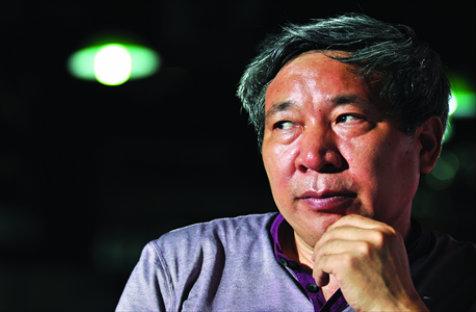A colossal satire about the unrelenting pursuit of wealth, and the inadvertent corruption and greed which inevitably accompany such quests, Lenin’s Kisses is a heartrending account of what happens to the disabled residents of the village of Liven when they decide to ‘enter society’ and participate in the cooperative mechanisms that underpin the modern day republic of Communist China.
Blighted by blindness, deafness, muteness or a disability of some sort, the 197 residents of the fictional Liven lead a blissful uncomplicated existence under the watchful eye of their village head, Grandma Mao Zhi. Nestled in the isolated Balou mountain region outside the administrative map of any jurisdiction, Liven was effectively shielded from the political uprisings and economic developments that affected wider China until Grandma Mao Zhi – with the best intentions – decided to push Liven into the collective rule that governed all regions in China. What followed were extended periods of drought, famine and hardship for many of the disabled residents who had to compete with able-bodied citizens from the outer reaches, otherwise known as wholers, for scarce resources.
The residents’ lives are catapulted into disarray once again when an unexpected seven-day summer snowstorm destroys their grain crops and disrupts their livelihood – signalling an end to their idyllic reality as they know it.
An ambitious county official by the name of Chief Liu seizes the opportunity to service his own lofty ambitions when he convinces the disabled villagers of Liven to participate in a ‘Special-Skills Performance Troupe’. By using the proceeds from the ticket sales, Chief Liu intends to purchase Lenin’s embalmed corpse in Russia – which is falling into disrepair and misuse – and transport it to an elaborately constructed mausoleum in the mountains. Chief Liu is convinced the act will help him achieve widespread acclaim and attract unprecedented levels of tourism and wealth to the region.
Grandma Mao Zhi’s staunch resistance to her people participating in the special skills troupe, the disabled residents’ thirst to prove themselves as anything other than farmers, and Chief Liu’s mercenary tactics to boost his image are narrated alongside one another to produce an inescapable and palpable sense of tension that propels the story forward; the book as a whole serves as a warning about allowing excessive wealth, fame and success to impair one’s better judgement.
Inspiring joy and elation when the special-skills troupe achieve dizzying heights of success, and abject feelings of despair and disillusionment when they are haphazardly exposed to the cruelty of the outside world, Lenin’s Kisses draws upon myth, fact and irony to portray what happens when the best intentions go awry.
The book is unique in that its chapters – other than progressing only in odd numbers – comprise of passages narrating the present as well as excerpts containing footnotes where historical events are expounded upon in great detail.
A lyrical masterpiece that never fails to captivate, thanks to Yan Lianke’s richly evocative storytelling style, Lenin’s Kisses is a cautionary tale about wealth and power set within a wider political commentary about the inevitable fallout from China’s ongoing battle to balance its capitalistic aspirations with the tenets of its communist dream.
Rating: 4 stars out of 5
Lenin’s Kisses
By Yan Lianke
Translated by Carlos Rojas
Paperback, 500pp, RRP $22.99
ISBN: 9781922079435
Text Publishing
Actors:
Director:
Format:
Country:
Release:





